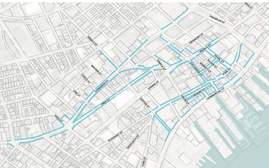MECA's focus: Teaching artists how to be 'creative entrepreneurs'
 Photo / Tim Greenway
Laura Freid, MECA president, in the painting classroom during a summer program for kids.
Photo / Tim Greenway
Laura Freid, MECA president, in the painting classroom during a summer program for kids.
Laura Freid became the 18th president of Portland's Maine College of Art in July 2017. Previously CEO and executive director of The Silkroad Project, a global cultural arts organization founded by cellist Yo-Yo Ma, her interest in the intersection of art and business was highlighted when she initiated Silkroad's affiliation with Harvard, established a five-year partnership with the Rhode Island School of Design and created the first joint venture with the Harvard Business School.
Freid's leadership experience before The Silkroad Project included serving as executive vice president for public affairs and university relations at Brown University and as chief communications officer at Harvard.
At the time of her appointment, Freid cited MECA and Portland as “an exciting American center for the arts, culture and entrepreneurship.” A year in, Mainebiz caught up with Freid to learn more about her vision of art and entrepreneurship and how that's playing out under her tenure. An edited transcript follows.
Mainebiz: Your career with Silkroad sounds exciting, days traveling globally with world-class musicians and artists. What brought you to MECA?
Laura Freid: I've always been committed to cultural entrepreneurship. I wanted to work with artists and connect them with entrepreneurs, particularly at the beginning of their careers. The artists we worked with through Silkroad were at the top of their career. I wanted to work with artists at a younger age. When I got a call from MECA and learned about their core values — artistic excellence, civic engagement and creative entrepreneurship. I said, “Wow, that's what I'm about.”
MB: You've talked about cultural entrepreneurship in pursuit of sustainable careers. What does “cultural entrepreneurship” mean?
LF: You're asking that 'what if' question. “What if we had trucks with food in them? Could that be a new way of having a restaurant?” That's strictly entrepreneurship. But creative or cultural entrepreneurship is entrepreneurship in the creative realm. Silkroad is a great example. You have musicians working at the highest level, but wanting to reach new audiences. So we created a new organization. We had the idea, but we needed the entrepreneurial pillars — financing and branding and audience-building — all those things that strictly would be called business tools. It's encouraging artists to think in a broader way. At MECA, we help students understand they have the talent but also need the skills to translate their aspirations into a business practice. That's relatively new.
MB: Example?
LF: Say a student is an illustrator. In the past, an illustrator would do great art and be hired by someone to do illustrations for a book. We teach our students — maybe they want to start a company or publish their own books. You take your artistic skill and turn it into an enterprise. Websites like Etsy and Rent the Runway allow artists to present their work in new ways that we didn't have before. You don't need an agent anymore. If you know how to create a website, you can promote yourself. We've had students do Instagram campaigns for their printmaking. And with writing, it used to be you had to work for a publication. Now you can create a blog and you're writing and publishing and circulating as a cultural entrepreneur.
MB: Do these ideas change the MECA curriculum in any way?
LF: We've been doing more to help students present their work. In foundation classes, students learn how to talk about their work. Everyone learns how to present their résumé. We have an artist-at-work program, where students are interning, so when they graduate, they've been in the professional world. The notion of the “starving artist” will change.
MB: What are your priorities for MECA?
LF: Forging community connections. I've talked with hundreds of community members, students, faculty, government leaders, donors — asking them where MECA should be going. The core of our work is the BFA degree, but I think there's potential for MECA to offer professional certificates — programs that might not be the traditional four-year degree. I think we'll be offering more master programs. And we also need to plan for more housing.














Comments